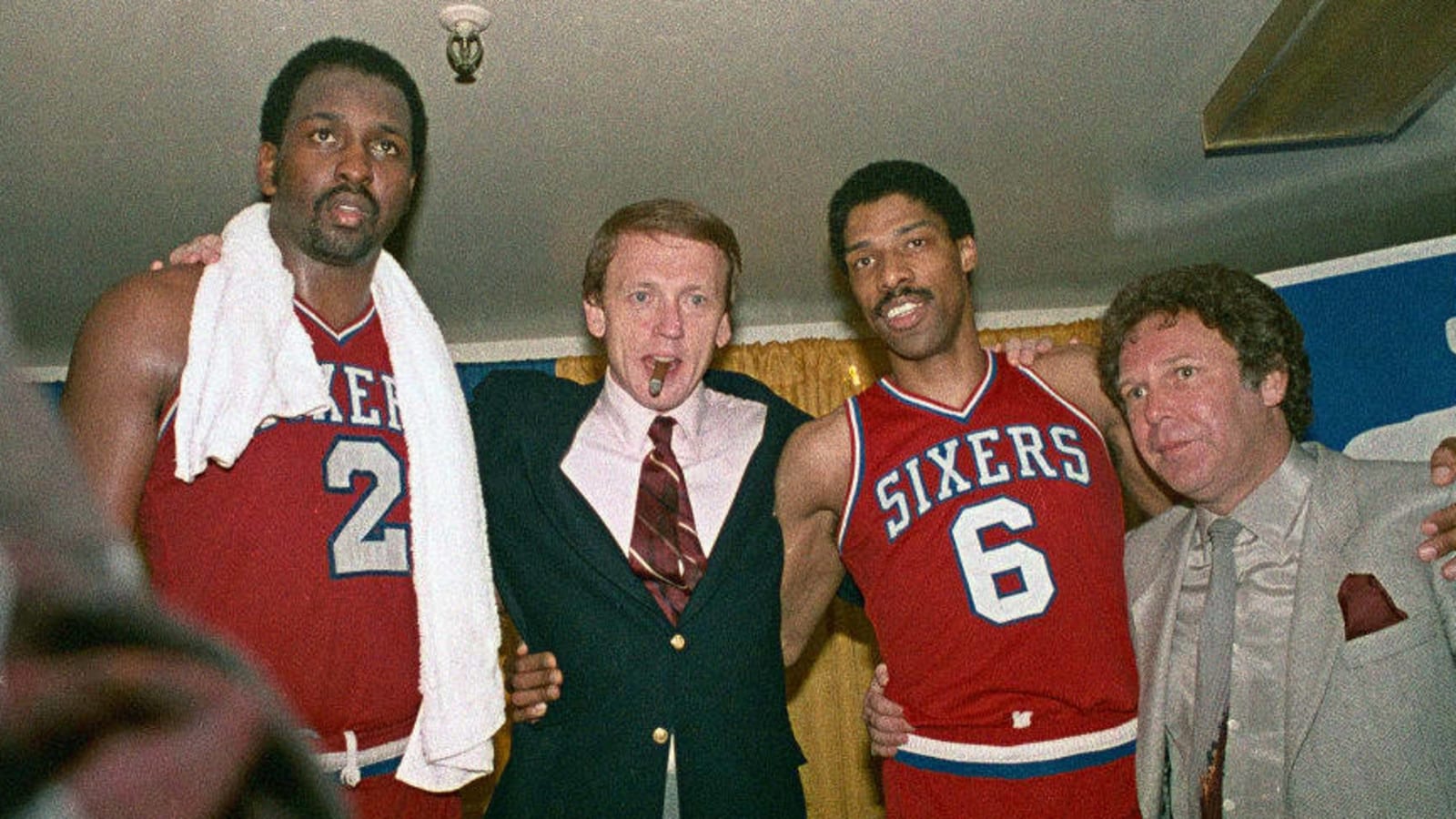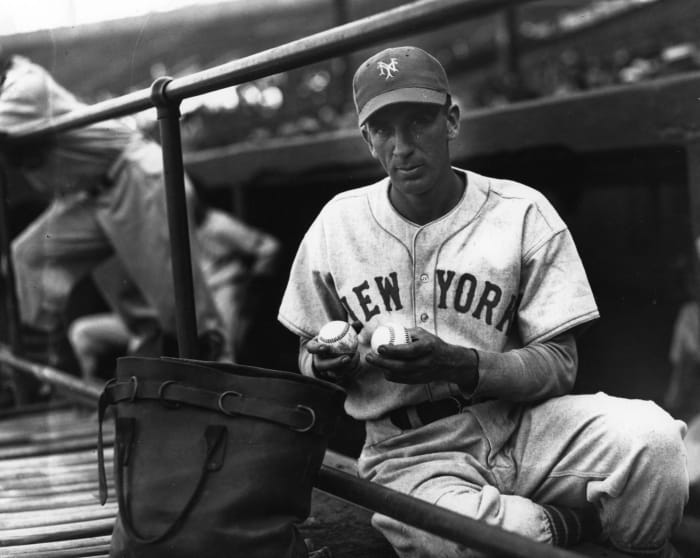
May 31 in sports history: 'Fo', (five), fo'!'
Here's a look back at notable sports news on May 31 through the years:
1983: In an 11-season period dominated by the Boston Celtics and Los Angeles Lakers from 1980 to 1990, the two rivals combined to win eight NBA championships. Yet, they would also find themselves as the necessary foils for those seemingly rare victories by interlopers. And no team staked its claim so emphatically in that period like the 1982-83 Philadelphia 76ers.
The proof is in the pudding: Prior to the start of the ’83 playoffs, the late great Moses Malone was famously asked how he expected the postseason to go for the Sixers, who traded for his services in the prior offseason. Without hesitation, he told the reporter “fo’, fo’, fo’!”
No, Malone wasn’t misreading "Jack and the Beanstalk," but he expected that the Sixers would run through all who opposed them. With a first-round bye in tow, they swept New York in four and dispatched Milwaukee in five to reach the Finals. And on this final day in May, the Sixers ensured the last "fo" with a 115-108 series-sweeping win over the Lakers in L.A.
Philadelphia was down 14 at the half, but the great Julius Erving iced the game, the champagne and the Larry O’Brien trophy with a brilliant fourth quarter. After losing three times in the Finals between 1977 and 1982, the sentiment was clear, even to the Lakers themselves: This title was for Dr. J. “When you keep losing in the finals, it takes a tremendous toll,” Lakers head coach Pat Riley said after the sweep. “They had a lot of guys who tasted nothing but the pain, and that’s bad. Getting Moses was the best move they could have made.”
Was it ever. Going against another Hall of Fame center in Kareem Abdul-Jabbar, Malone was absurdly dominant in every game, capping the series with a 24-point, 23-rebound performance that also won him the Finals MVP award.
NET GAINS
2002: In one of the most dramatic turnarounds in NBA history, the New Jersey Nets went from cellar-dwellers to conference champions within one season. Despite being on the wrong end of the most epic single-game playoff collapse ever early in the Eastern Conference Finals, the Nets took the Boston Celtics through the ringer for the remainder of the series. They would take out the Cs in their own building with a 96-88 win that put them in the NBA Finals.
After a 26-win campaign in 2000-01, the Nets shook things up with a monster trade that sent the talented, but beleaguered guard Stephon Marbury to Phoenix for Jason Kidd. With Kenyon Martin, Keith Van Horn, Kerry Kittles and rookie Richard Jefferson, the future Hall of Fame point guard had New Jersey running a fast-tempo offense that stunned just about everyone in the league.
Kidd showed the basketball world why he arguably should have won the NBA MVP that year, as he became just the second player to average a triple-double in a playoff series. (Magic Johnson was the first.) In Game 6, Kidd scored 15 points — including a deep three-ball that crushed nearly every soul at what’s now TD Garden — grabbed 13 rebounds and dished out 13 assists.
Adrian Wojnarowski (then with the Bergen County Record) captured the disbelief well. “This is something out of Sci-Fi (channel),” the now-ESPN insider quipped. “This is out of 'The Twilight Zone.' Rod Thorn? Where was Rod Sterling? The New Jersey Nets are going to the NBA Finals.”
New Jersey would go on be swept in the series by the Los Angeles Lakers.
ALL GOOD THINGS COME TO AN END

1937: Hall of Fame lefty Carl Hubbell spent his entire career putting hitters in a trance, but one can say he earned his bust in Cooperstown with a MLB-record 24-game winning streak.
So it seemed fitting that the team that would put an end to it would be the rival Brooklyn Dodgers. In another contentious May doubleheader between the NYC rivals, the Dodgers knocked Hubbell out in the fourth inning of a 10-3 win in the first game. Hubbell got touched for five earned runs, seven hits and three walks, just striking out one batter. Adding to his bad day were two hit batters and a wild pitch.
The numbers behind the streak are mind-boggling, regardless of era. Including relief appearances and no-decisions, Hubbell pitched in 27 games with 22 starts, threw 19 complete games and two shutouts. Over 207.2 innings, the two-time MVP still allowed more hits than strikeouts (159 vs. 104), but magically used that screwball for a 1.78 ERA.
HITTING THE LINKS
1930: Bobby Jones won the British Amateur Championship (the British Open) at St. Andrew’s, besting Roger Wethered. It would be the first leg of his (pre-Masters) Grand Slam.
1942: Sam Snead won his first major, beating Jim Turnesa for the PGA Championship.
1949: Snead grabbed another PGA Championship win, knocking off Johnny Palmer. Snead became the first Masters winner to take the PGA Championship in the same calendar year.
JUST SOME (WORLD-RECORD) SPEED WORK
2008: The spotlight on track and field is never larger than in an Olympic year, but few athletes have captured the world’s attention like Usain Bolt. The Jamaican superstar competed at the Reebok Grand Prix in New York City, running in one of a handful of tune-ups toward the Summer Games in Beijing. Trying to avoid the longer and more taxing 400-meter races in these contests, Bolt had been running the 100-meters for “speed work.”
The man with the most appropriate surname in sports ran the 100-meter race in 9.72 seconds, setting a new world record and making him the world’s fastest man. By the way, Bolt broke a personal best from just weeks prior when he ran a 9.76. “I wasn’t really looking for a world record, but it was there for the taking,” he told an awed media gaggle afterward.
Technique and power have always separated elite sprinters from the rest, but Bolt’s height (6-foot-3) always gave way to a longer stride on the track. Tyson Gay, who stood at 5-foot-11, told Sports Illustrated that “it looked like his knees were going past my face.”
FOR THE 'NEVER TOO OLD' IN ALL OF US
2015: Classical pianist Harriette Thompson played at Carnegie Hall three times. She survived cancer twice. And at 92 years and 65 days old, she became the oldest woman to ever complete a marathon. Running in her 16th Rock 'n' Roll Marathon in San Diego, Thompson finished the 26.2-mile trek in seven hours, 24 minutes and 36 seconds.
Thompson considered the 2015 race to be her most difficult. She lost her husband in January that year and dealt with complications from a staph infection. The Charlotte, North Carolina, native was properly feted when she crossed the finish line, but she was also reflective of the hard journey to get there.
“I don’t think I’d be living today if I didn’t do this running,” Thompson told the Associated Press.
That Thompson even ran marathons at such an advanced age was remarkable when you consider that she didn’t begin the long-distance runs until she was 76 years old. In 1999, Thompson was inspired by a friend who was participating in the Rock 'n' Roll Marathon to raise money in the fight against cancer. Where her friend was there to walk the miles, Thompson chose to run. “I noticed when I got there that everybody was running, so I decided to run,” she once said in a video for her alma mater, Syracuse University.
Thompson, who lived a remarkable life beyond the marathon path, died in 2017 at the age of 94.
Happy birthday...
- Joe Namath, New York Jets quarterback famous for successfully predicting victory in Super Bowl III despite being the underdog. Namath’s Hall of Fame career also included three division championships. Broadway Joe gained celebrity status, starring in movies and TV commercials, including with then-icon Farrah Fawcett. In a recent autobiography, Namath admits to excessive drinking that nearly killed him. (77)
- Jordy Nelson, former wide receiver for the Green Bay Packers and Oakland Raiders. Nelson won a Super Bowl with Green Bay and led the league in touchdown receptions with 14 in 2016 when he was named the Comeback Player of the Year. (35)
- Jim Craig, gold-medal-winning goaltender in the 1980 Olympics “Miracle on Ice” game. Craig stopped 36 of 39 shots to lead the Americans to the shocking win over the Soviet Union. (63)
- Two-time Norris Trophy winner Erik Karlsson. The Swedish defenseman was a first-round draft pick of the Ottawa Senators where he spent his first nine years in the NHL before getting traded to the San Jose Sharks. (30)
- Former NBA player Nate Robinson, picked in the first round of the 2005 draft. The explosive point guard, who at 5-foot-9 was one of the shortest players in the league, played for 11 seasons with eight teams, including five seasons with the Knicks. (36)
- Former MLB center fielder Kenny Lofton, five-time AL stolen base champ and six-time All-Star. Lofton is also a four-time Gold Glove winner and holds the record for the most stolen bases in the postseason at 34. His 622 career steals are 15th all-time. (53)
- National League 2005 Cy Young Award winner Jake Peavy, who also led the NL in strikeouts in 2005 and 2007. Peavy won a World Series with Boston and with San Francisco. (39)
R.I.P
2011: Hall of Fame defensive end Andy Robustelli, who was considered a key member of championship teams with the Rams and Giants. Following retirement, he served as an assistant coach and GM for the Giants. He was 85.
1983: Boxer Jack Dempsey, who held the World Heavyweight title for seven years. Dempsey had 49 knockouts over his 13-year career with his signature aggressive style and power. ESPN once ranked The Manassa Mauler as the ninth-best boxer of all time. He died of heart failure at 87.
1970: Terry Sawchuk, Hall of Fame goaltender who spent most of his 21-year NHL career with the Detroit Red Wings. Sawchuk’s 103 career shutouts rank second all-time behind Martin Brodeur. He won the Calder Trophy and was a four-time Stanley Cup and four-time Vezina Trophy winner. Sawchuk died of a pulmonary embolism, following “horseplay” with a teammate. He was 40.
May 30: Mantle's monster of a mash
More must-reads:
- May 30 in sports history: Mantle's monster of a mash
- May 29 in sports history: 'Goober stupid'? Nah. She was fabulous
- The 'Most points in a playoff game by team' quiz
Breaking News
Customize Your Newsletter
 +
+
Get the latest news and rumors, customized to your favorite sports and teams. Emailed daily. Always free!

